
FACULTY OF ARTS AND SCIENCES
Department of Sociology
SOC 320 | Course Introduction and Application Information
| Course Name |
Aging Society
|
|
Code
|
Semester
|
Theory
(hour/week) |
Application/Lab
(hour/week) |
Local Credits
|
ECTS
|
|
SOC 320
|
Fall/Spring
|
3
|
0
|
3
|
6
|
| Prerequisites |
None
|
|||||
| Course Language |
English
|
|||||
| Course Type |
Elective
|
|||||
| Course Level |
First Cycle
|
|||||
| Mode of Delivery | - | |||||
| Teaching Methods and Techniques of the Course | - | |||||
| Course Coordinator | - | |||||
| Course Lecturer(s) | - | |||||
| Assistant(s) | - | |||||
| Course Objectives | To introduce students with basic sociological terms and discussions of the aging society. |
| Learning Outcomes |
The students who succeeded in this course;
|
| Course Description | This course discusses peculiar dynamics and problems of aging by examining sociological theories on the aging society. It aims to understand economic, social and cultural life experiences of older population in a crosscultural perspective. It also examines living arrangements and social policies required to empower older people. |
|
|
Core Courses | |
| Major Area Courses |
X
|
|
| Supportive Courses | ||
| Media and Management Skills Courses | ||
| Transferable Skill Courses |
WEEKLY SUBJECTS AND RELATED PREPARATION STUDIES
| Week | Subjects | Related Preparation |
| 1 | Presentation and OVerview of the Course | |
| 2 | Introduction to the Field of Social Gerontology | L.J. Malcolm (ed.), The Cambridge Handbook Of Age And Aging, 2005, Cambridge University Press, Chapter 1.1 and 1.2 |
| 3 | Causes and Consequences of Ageism | E. B. Palmore, Ageism: Negative And Positive, 1999, Springer Publisher Company, Part 2 |
| 4 | Interdisciplinary Perspectives on Aging | J. Quadagno, Aging and the Life Course: An Introduction to Social Gerantology, 1999, The McGrawHill Companies, Chapters, 5,6,7 Suggested reading: A.G. Baran “Yaşlılığın Anlamı Üzerine Niteliksel Araştırma”, II.Ulusal Yaşlılık Kongresi Kitabı, 2003, 9 12 Nisan, Denizli: 121 140. |
| 5 | Welfare State and Politics of Age | J. Quadagno, Aging and the Life Course: An Introduction to Social Gerantology, 1999, The McGrawHill Companies, Chapter 4 G. E. Andersen, et al. (ed), Why Do We Need a New Welfare State, in J. Myles, “A New Social Contract for the Elderly”, 2002, Oxford University publications, pp. 130 173. |
| 6 | MIDTERM I | |
| 7 | Social Aspects of Aging | J. Quadagno, Aging and the Life Course: An Introduction to Social Gerantology, 1999, The McGrawHill Companies, Chapters 8,9 N. Agahi and M.P. Parker, “Leisure activities and mortality: Does gender matter?”,Journal of Aging and Health, 2008, 20(7): 855 871. |
| 8 | Living Arrangement for Elders | J. Quadagno, Aging and the Life Course: An Introduction to Social Gerantology, 1999, The McGrawHill Companies, Chapters 10, 13 A. Bukov, I. Maas, and T. Lampert, “Social participation in very old age: Cross sectional and longitudinal findings from BASE”, Journal of Gerontology, 2002, 57(6): 510 517. |
| 9 | Successful Aging and Increasing the Quality of Life | P. Baltes & M. Baltes, Succesful Aging: Perspectives From The Behavioral Sciences, Cambridge University Press 1993, pp.4, 5, 1927. C. Borg et al., “Life satisfaction in 6 European countries: The relationship to health, selfesteem, and social and financial resources among people (aged 6589) with reduced functional capacity”, Geriatric Nursing, 2008, 29(1), 48 57. |
| 10 | Elder abuse, Gender and Aging | S. Crichton et al., “Elder Abuse Feminist and Ageist Perspectives”, Journal Of Elder Abuse & Neglect, 1999, 10(34), 115 130 J.C. Henrard, J. C. “CulturalProblems of Aging Especially Regarding Gender and Intergenerational Equity”, Social Science & Medicine, 1996, 43 (5), 667 680. |
| 11 | Area studies: The Status of the Old Age Population in Turkey | T. Ünalan, “The Status of the Old Age Population in Turkey” in Nüfusbilim Dergisi, 2000, 22 (1) pp. 25 35, Hacettepe Üniversitesi Nüfus Etütleri Enstitüsü Suggested reading: A.G. Baran, “Türkiye’de Yaşlılık Politikalarının Sosyolojik Analizi”, I. Ulusal Yaşlılık Kongresi Kitabı, 2001, 10 11 Ekim, Ankara: 256 277. |
| 12 | MIDTERM II | |
| 13 | Area studies: Intergenerational Solidarity and migration in Turkey | Kalaycıoğlu, S. ve H. RittersbergerTılıç (2000). “Intergenerational Solidarity Networks of Instrumental and Cultural Transfers within the Migrant Families in Turkey.” Aging And Society. Cilt:20. ss. 523 542. Suggested readings: S. Kalaycıoglu, and H. Rittersberger Tılıç, H. (2001). “Yaşlı ve genç kuşaklar arasında sosyal, kültürel, ekonomik bağların ailenin refah düzeyine etkisi”, Yaşlı Sorunları Araştırma Dergisi, 1(2):65 75. Ö. Arun, “Yaşlı bireyin Türkiye serüveni, kaliteli yaşlanma imkanı üzerine Senaryolar”, Gaziantep Üniversitesi Sosyal Bilimler Dergisi, 2008, 7(2): 313 330. |
| 14 | Coping Strategies with Aging | L. Demers et al., “Coping strategies and social participation in older adults”, Journal of Gerontology, 2009, 55:233 239 A. Jonker et al., “The role of coping resources on change in wellbeing during persistent health decline”, Journal of Aging and Health, 2009, 21:10 63 World NGO Forum, Final Declaration and Recommendation of the World NGO Forum on Aging: “Development and the Rights of the Elderly”, 2002, Madrid. |
| 15 | Review of the Semester | |
| 16 | Final Exam |
| Course Notes/Textbooks | Must readings mentioned in this information sheet. |
| Suggested Readings/Materials |
EVALUATION SYSTEM
| Semester Activities | Number | Weigthing |
| Participation |
1
|
10
|
| Laboratory / Application | ||
| Field Work | ||
| Quizzes / Studio Critiques | ||
| Portfolio | ||
| Homework / Assignments | ||
| Presentation / Jury |
1
|
15
|
| Project | ||
| Seminar / Workshop | ||
| Oral Exams | ||
| Midterm |
2
|
40
|
| Final Exam |
1
|
35
|
| Total |
| Weighting of Semester Activities on the Final Grade |
65
|
|
| Weighting of End-of-Semester Activities on the Final Grade |
35
|
|
| Total |
ECTS / WORKLOAD TABLE
| Semester Activities | Number | Duration (Hours) | Workload |
|---|---|---|---|
| Theoretical Course Hours (Including exam week: 16 x total hours) |
16
|
3
|
48
|
| Laboratory / Application Hours (Including exam week: '.16.' x total hours) |
16
|
0
|
|
| Study Hours Out of Class |
15
|
3
|
45
|
| Field Work |
0
|
||
| Quizzes / Studio Critiques |
0
|
||
| Portfolio |
0
|
||
| Homework / Assignments |
0
|
||
| Presentation / Jury |
1
|
15
|
15
|
| Project |
0
|
||
| Seminar / Workshop |
0
|
||
| Oral Exam |
0
|
||
| Midterms |
2
|
21
|
42
|
| Final Exam |
1
|
30
|
30
|
| Total |
180
|
COURSE LEARNING OUTCOMES AND PROGRAM QUALIFICATIONS RELATIONSHIP
|
#
|
Program Competencies/Outcomes |
* Contribution Level
|
||||
|
1
|
2
|
3
|
4
|
5
|
||
| 1 | To have the knowledge of classical and contemporary theories in sociology, and be able to comparatively analyze these theories. |
X | ||||
| 2 | To have the knowledge of main methodological approaches in sociology as well as social research and data analysis methods. |
X | ||||
| 3 | To have knowledge in the fields of general sociology, sociology of institutions, social structure and change, and applied sociology. |
X | ||||
| 4 | To be able to determine the appropriate methods in the design of the planning stage and conclusion of a sociological project, individually or as part of a team. |
X | ||||
| 5 | To be able to diagnose the social dynamics behind personal problems by using sociological imagination. |
X | ||||
| 6 | To be able to define social problems at local, national, and global level, and offer new policies for solutions. |
X | ||||
| 7 | To be able to apply commonly-used computer programs for data collection and analysis in sociological research. |
|||||
| 8 | To be able to develop a socially responsible, scientific and ethical perspective regarding the collection, analysis, interpretation and presentation of data. |
X | ||||
| 9 | To be able to analyze different aspects of the social world by drawing on the knowledge produced by other disciplines of the social sciences. |
|||||
| 10 | To be able to constantly renew herself/himself professionally by following scientific and technological developments in sociology and social research. |
|||||
| 11 | To be able to collect sociological data and communicate with sociologists and other social scientists in a foreign language ("European Language Portfolio Global Scale", Level B1). |
|||||
| 12 | To be able to speak a second foreign at a medium level of fluency efficiently. |
|||||
| 13 | To be able to relate the knowledge accumulated throughout the human history to their field of expertise. |
|||||
*1 Lowest, 2 Low, 3 Average, 4 High, 5 Highest
NEWS |ALL NEWS
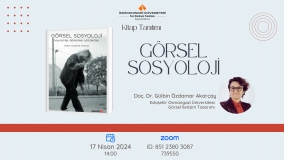
Book Presentation and Talk: Visual Sociology
Department of Sociology invites you to the Book Presentation and Talk event with Gülbin Özdamar Akarçay, the author of “Visual Sociology". Date:
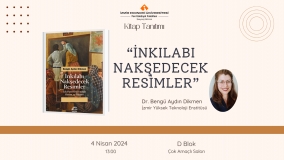
Book Presentation and Talk: Painting the Revolution
Department of Sociology invites you to the Book Presentation and Talk event with Dr. Bengü Aydın Dikmen, the author of “Painting the
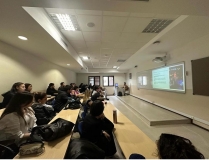
We welcomed ethnomusicologist Onur Sönmez.
We held our sociology seminar where we hosted ethnomusicologist Onur Sönmez. We thank him very much for this detailed and interesting presentation.
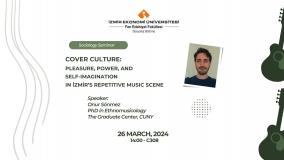
Cover Culture: Pleasure, Power, and Self-Imagination in İzmir’s Repetitive Music Scene
You are cordially invited to the Sociology Seminar where we will host Dr. Onur Sönmez. Onur Sönmez has a PhD in ethnomusicology
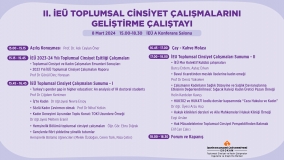
II. IUE GENDER STUDIES DEVELOPMENT WORKSHOP (EKOKAM- Gender and Women’s Studies Research and Application Center)
Research Assistant Helin Kardelen Kavuş attended the “II. IUE Gender Studies Development Workshop” on March 8, 2024, International Women's Day. Organized by EKOKAM, the workshop
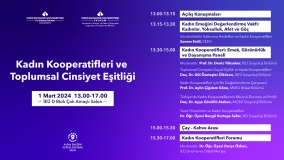
Women’s Cooperatives and Gender Equality
You are cordially invited to "Women's Cooperatives and Gender Equality", which will be co-organized by IUE EKOKAM, the Department of Sociology, and
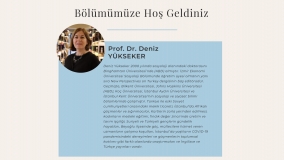
Welcoming Our New Faculty Member: Professor Deniz Yükseker
We are proud to welcome and introduce our newest faculty member: Professor Deniz Yükseker. We wish her all the best and success
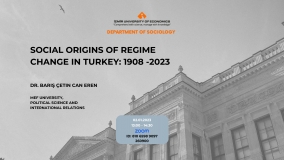
Sociology Seminar: Social Origins of Regime Change in Turkey: 1908 -2023
Department of Sociology cordially invites you to a seminar on "Social Origins of Regime Change in Turkey: 1908 - 2023" by Dr.



